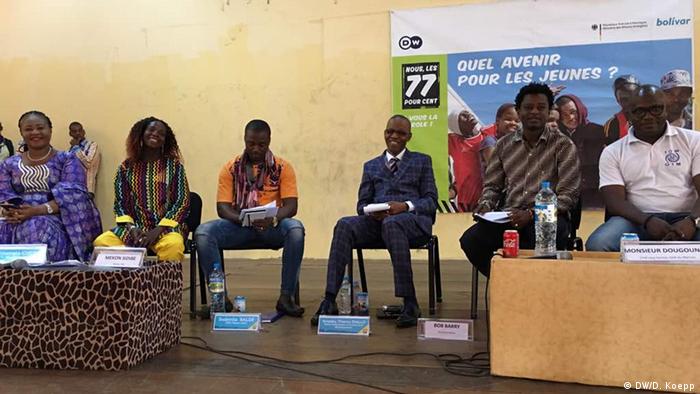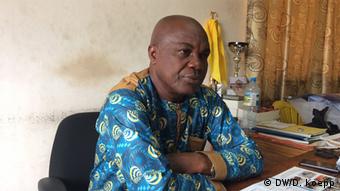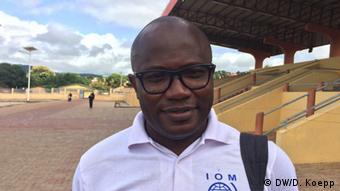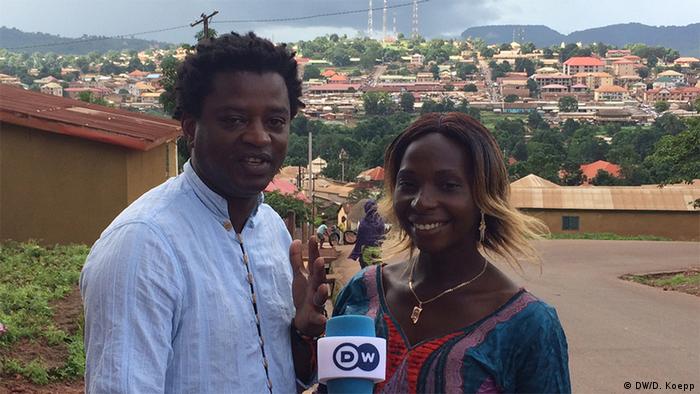From Guinea, thousands of people to Europe, including a countless number of mind-year. In the framework of the series “77 percent” has discussed the DW in a panel discussion on Alternatives to Emigration.

Suddenly the large, strong man breaks out in tears. He must to the five boys think, who set out with his son to Europe. Without Papers. Through the desert and over the Mediterranean sea. With a trembling voice Aboubacar Doukouré told that all five are dead: in the Mediterranean sea, drowned. His son was lucky: Doukouré pulled him back before he reached the Sahara. “He had stolen all my cash and wanted to go to Europe to become a footballer,” recalls Doukouré. “When he called me from Mali, because he had no money, I sat on a motorbike to fetch him.” Not even 15 years old, his son was at the time.
DW discussed the reasons for Migrating on-site
Aboubacar Doukouré is the Director of the “Maison des Jeunes” (the youth house) in Mamou, a small town in the centre of the West African state of Guinea. Here, the DW held on Saturday (14.07.2018) with your local Partner, Radio Bolivar FM, a panel discussion on the future of the Guinean youth. The debate is part of the multi-media project, “77 percent”, which implements the DW with the financial support of the Federal Foreign office in the six African languages of the DW (Amharic, English, French, Hausa, Portuguese and Swahili): 77% – the proportion of people in Africa, according to the world Bank to be younger than 35 years.

Has brought his 15-year-old son from Mali back: youth house Director Aboubacar Doukouré
The DW project is in the Radio magazines, Videos and discussions on social media topics, the young people in Africa deal with: unemployment, lack of political influence, forced marriage, education and Migration. And it shows, on the basis of positive examples, that there are Alternatives to irregular Migration. In debates in the Gambia, Guinea, Mali and Nigeria, the DW discussed with young people about their future, a dialogue in the respective companies.
Hotspot for expats
In Mamou in Guinea, a blogger, a representative of the International organization for Migration (IOM), a development expert and the head of a local organization that is committed to combating illegal Migration, as well as a young returnee sat on the Podium.
Mamou is a transport node is: All the roads in the neighboring countries of Mali, Senegal or the ivory coast through the small town, about 250 kilometers from the capital Conakry. Many of those from Guinea from irregular on the way to Europe, coming from Mamou. “Here almost every family has to do with irregular Migration,” said Mohamed Dougouno, head of office of IOM in Mamou. In the first three months of 2018 were recorded in Italy, approximately 14,000 Guineans. More migrants came from Syria and Nigeria in Italy. “Guinea is a small country, and there is no war like in Syria or Terror by Boko Haram in Nigeria,” Dougouno. Instead, there is a huge social pressure to go to Europe and to have success. Often it was the parents who drove their children in the Migration.

Mohamed Dougouno, head of office of IOM in Mamou: The social pressure to emigrate is high
In fact, nearly everyone in Mamou, a history of Europe from someone who went. Sometimes it is the little brother, a Cousin or a friend. Often there are stories of death and torture. “There are even eleven-year-old, on the way,” says Mohamed Dougouno of the IOM. “You often do not know why you want to get away. ‘A friend suggested it to me’, you tell us. Or you have photos on Facebook seen by migrants in Europe, posing in front of cars or on the Champs-Elysées,” says Dougouno. “The social networks have great influence.”
If you are lucky, it will be stopped
The children steal from their parents or relatives and to make secretly. If you are lucky, you will be stopped by Guinean border officials or of the IOM in a timely manner and brought back. As the 15-year-old Mamadou, who is now sitting on the Podium of the DW. He made it to Libya, where it was picked up by the militia, in prison tossed, and tortured. The IOM freed him and brought him back to Mamou. Now he is in psychological treatment and pushes back to school. “He was this year, the best-in-Class,” says Dougouno.

Mekon Sidibé of Bolivar FM (R) and Bob Barry of DW French have moderated the panel discussion in Mamou
“We must reach the youth understands that you can have in Guinea success”, underlines Mouctar Diallo, youth Minister of the country, in an interview with DW. In the debate in Mamou, he is holding a flaming appeal to the parents: “don’t Let go away your children! Not supported, not even with money! This is a bad investment!” The Minister stressed the importance of the debate, the DW is to have a dialogue in the society. “I’ve seen in Europe Guineans worse off than you here,” he calls into the room. “And I know people much more successful than those who are left.”
Also Aboubacar Doukouré, Director of the Maison des Jeunes in Mamou, is convinced: “The families have to finally understand that happiness may also lie on your own doorstep.” His son, however, has been included in a football boarding school in Hamburg. “Quite legal,” stresses his father. He proudly shows photos of the now 17-Year-olds in Training: in front of the Hamburg city hall, with friends in the Café. But then he pauses thoughtfully and says: “But actually, he would have been able to stay here.”

